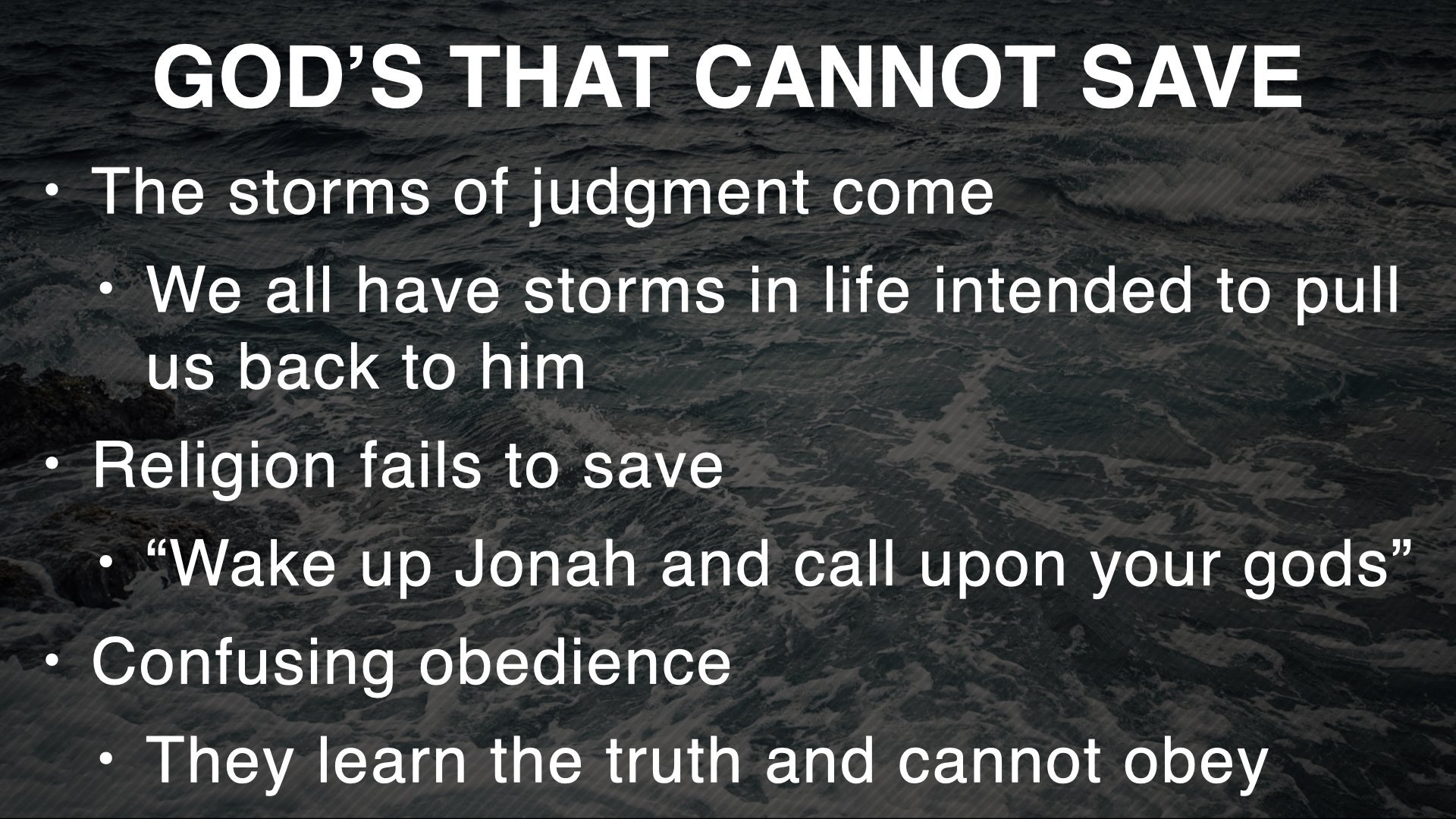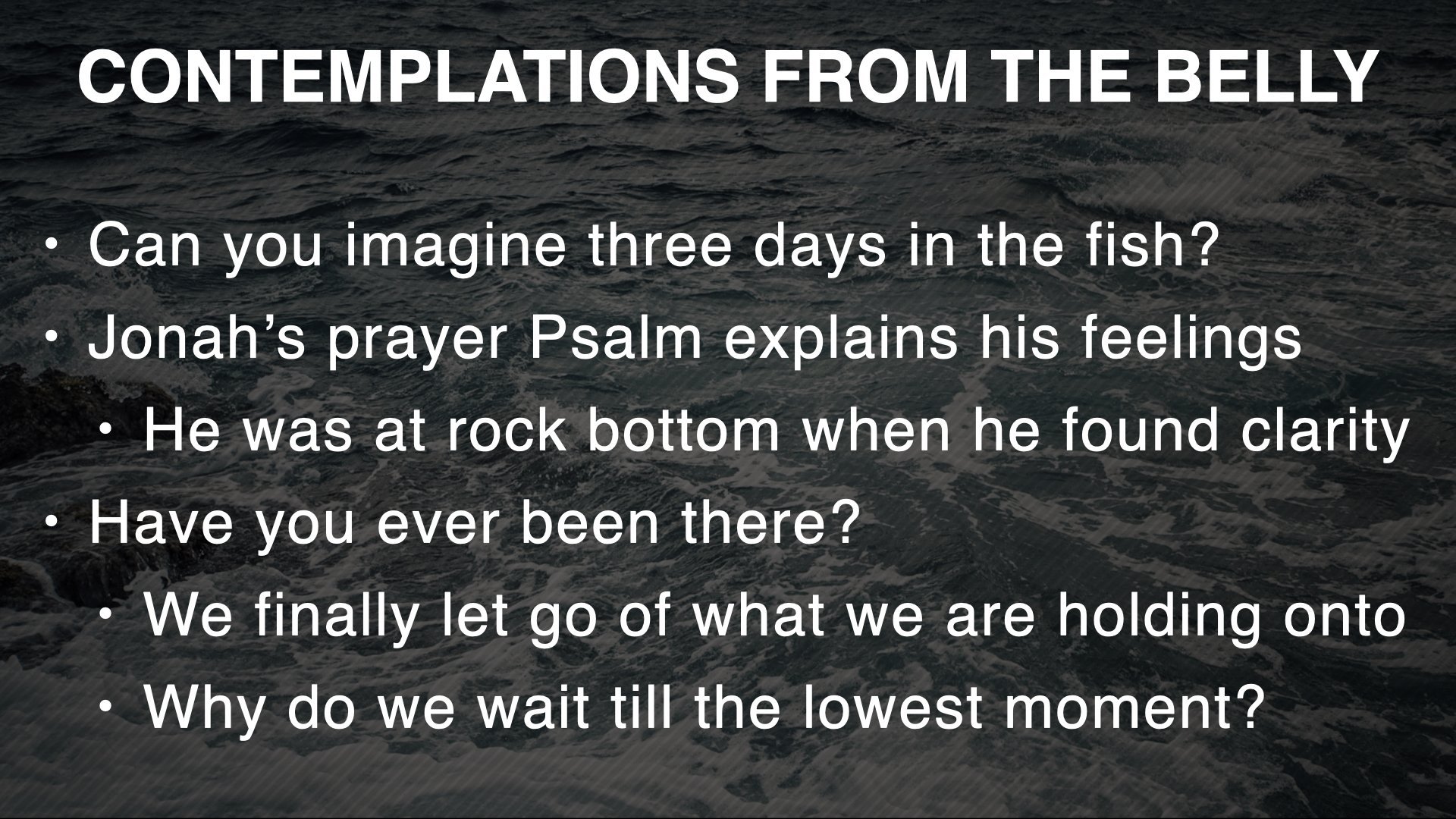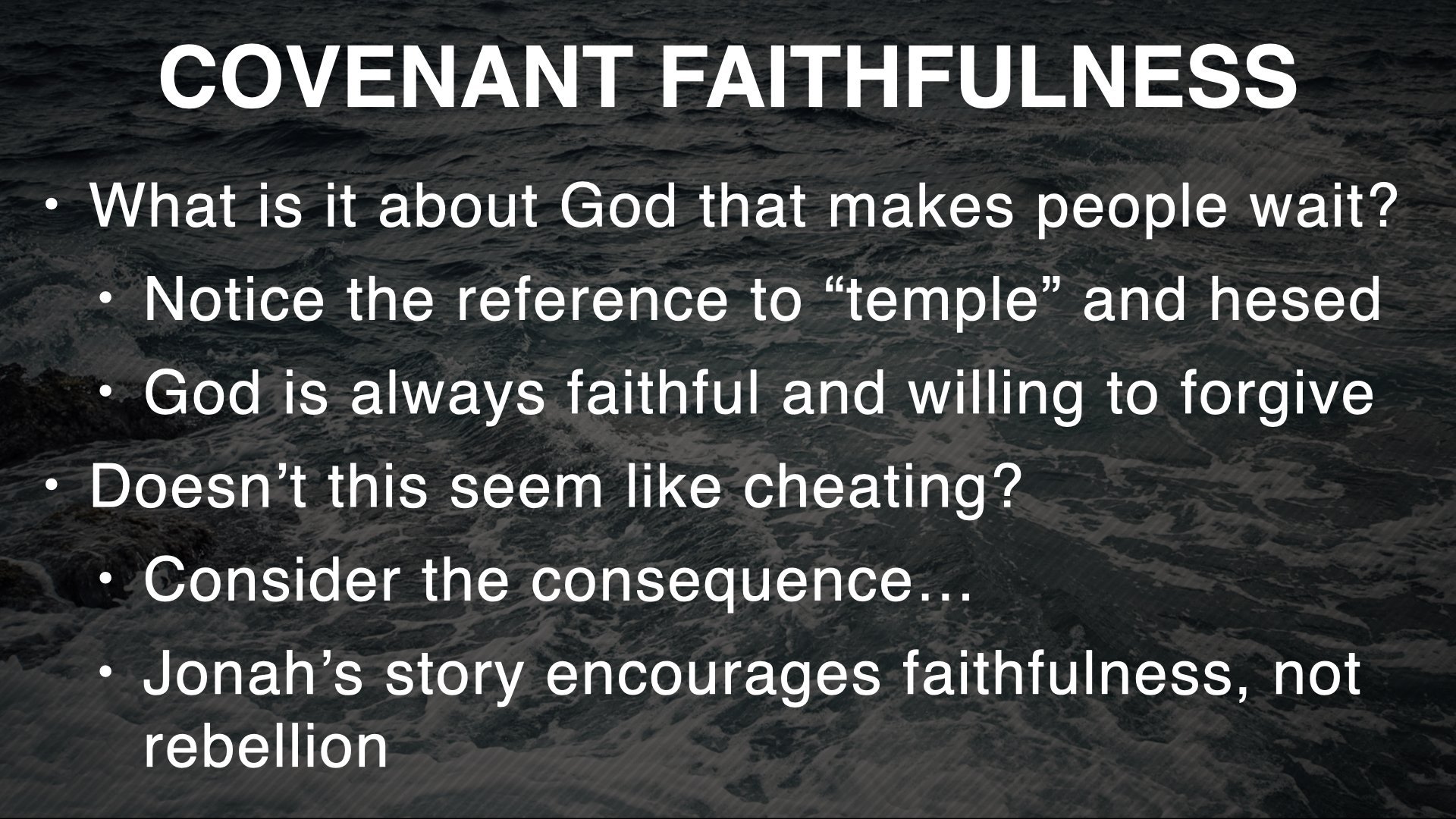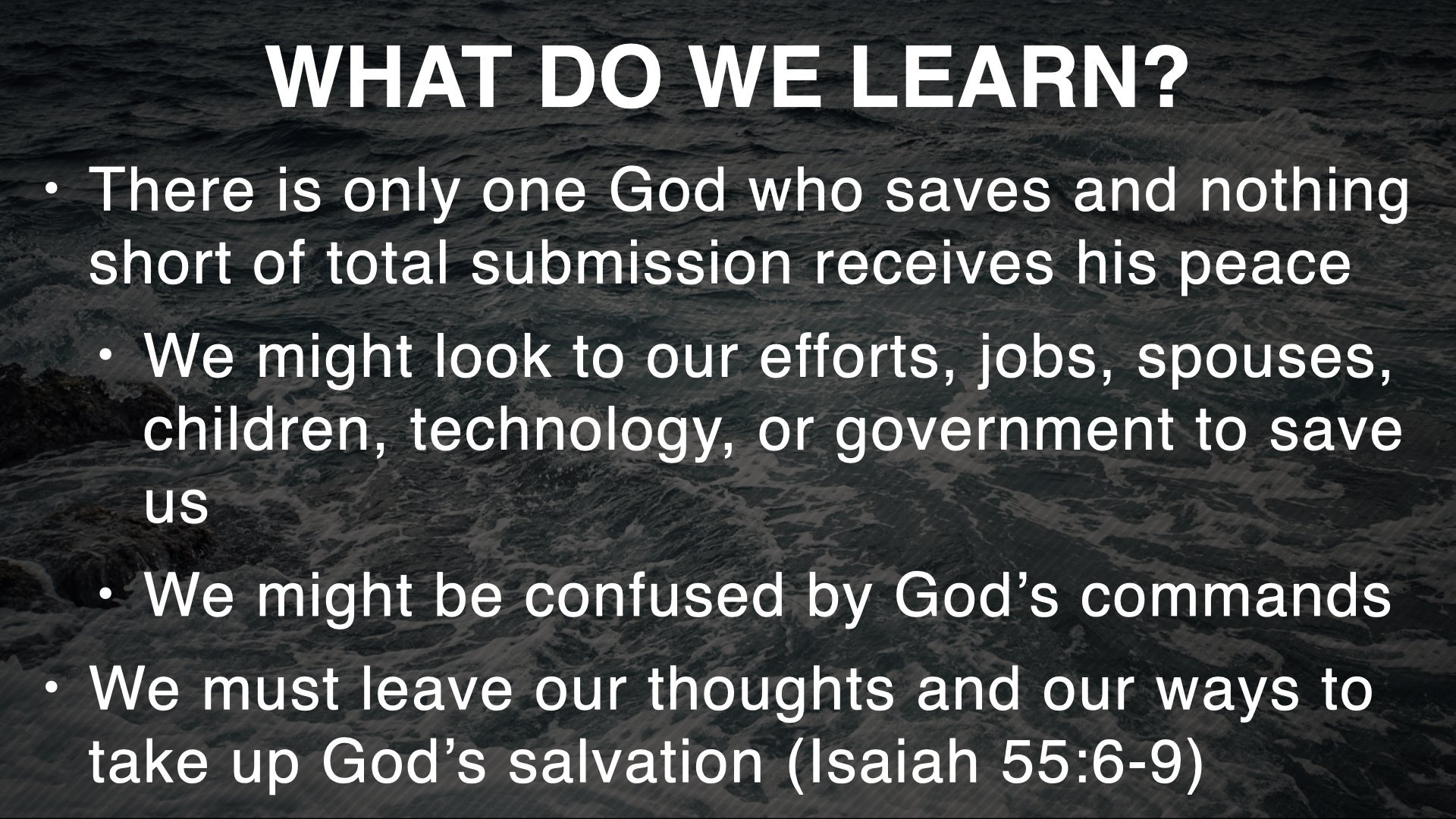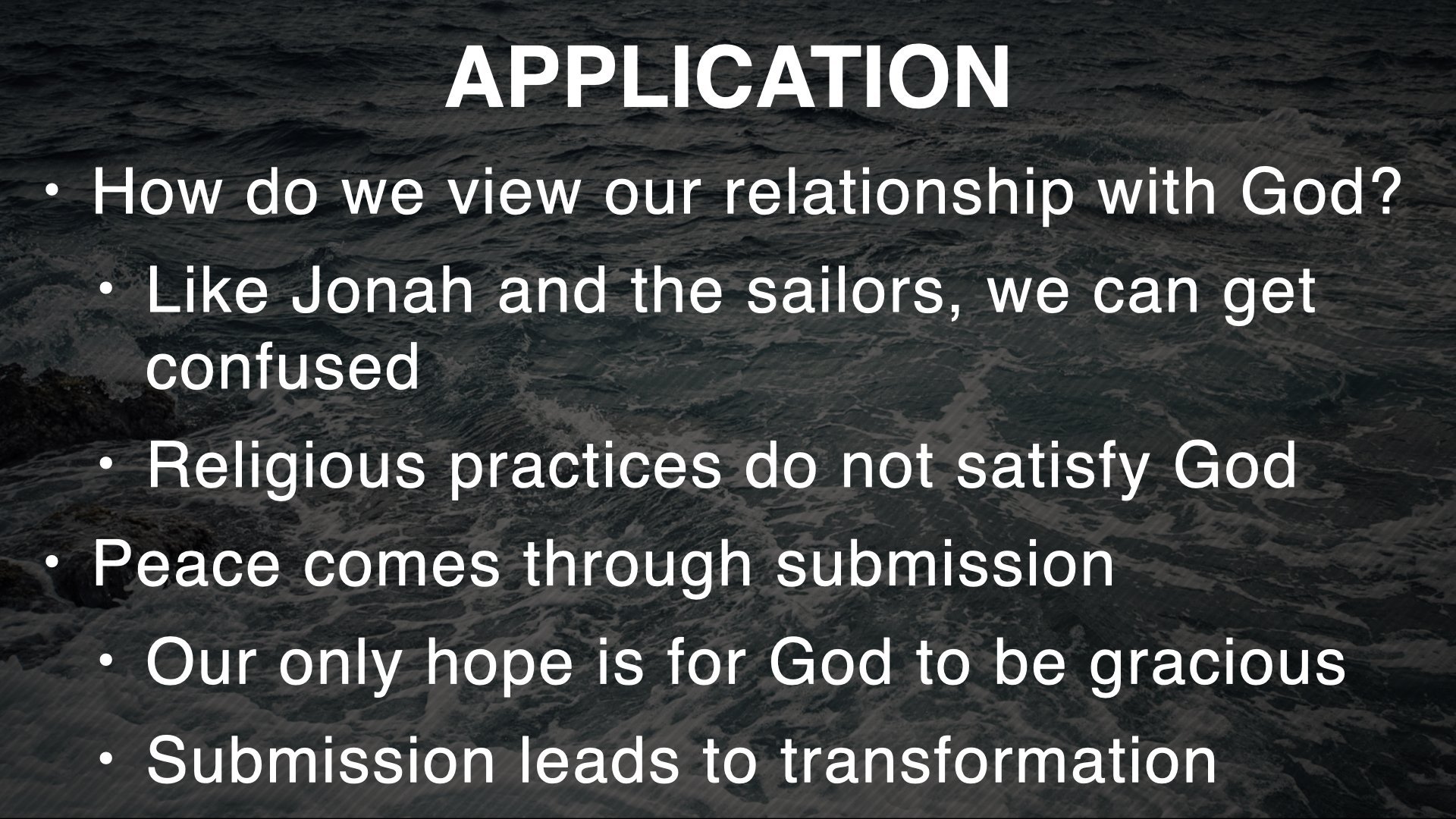Salvation Submission (Jonah 1-2)
It is a common struggle to submit ourselves fully to God. We are filled with doubts, fears, and worries that can keep us from fully trusting in the Lord's will. As our lives become more complex, we often find it challenging to commit to the path of righteousness and obedience that God calls us to. Our minds tend to wander toward our desires and ambitions instead of fully submitting ourselves to God's guidance.
God's grace is one of the most beautiful gifts that we are given in life. Unfortunately, it is easy for us to take it for granted. We might get complacent and forget that his grace is expected to transform us. I have often said that we must submit our will to God's will to have a relationship with God. Tonight, our text confirms that twice over.
Last time, we looked at the first chapter of Jonah, but I want us to revisit it for a moment before we move to the next section. Jonah has rejected the commandment of God. He refused to go to Nineveh and preach God's message to his enemies. Instead, he boarded a ship to Tarshish, fleeing from the presence of the Lord.
Gods That Cannot Save
Some interesting things happen while Jonah is on that boat.
The Storms Of Judgment
First, we notice that God brings a storm upon the ship. He could have addressed Jonah's disobedience in many different ways, but he chose a storm that would affect all the sailors on that boat. He didn't make Jonah sick or wait until he got on shore to bring a famine. He doesn't have him captured by evil men. He sends a storm.
Last time, we considered how God's storm was intended to draw Jonah back to him. God was violently against Jonah, but he intended to save him from himself.
We all have storms in life. Not one person here has had a completely smooth life, and I'm convinced that some of our storms share the providential working of God to pull us back to him. When life gets you mad because everything is working against you, consider how God could use this trial to train you.
Religion Fails To Save
Now, there are a couple more things to learn from this boat ride before we move into tonight's lesson. You will notice in verse 6 that the captain woke Jonah from his sleep to urge him to get religious. When I say "religious," I mean he calls for Jonah to plead to his God. Isn't that fascinating? I imagine that sailors aren't typically a very religious bunch, but these men were at the mercy of the sea, and they were to the point where all they could do was call out for a god to save them. It didn't matter to them which god saved them. I imagine they had tried many household gods that they had brought with them on the ship. None of them were working. The sea was not subsiding. It was getting worse. All of their efforts to be religious were turning up empty. But there was one man who they hadn't asked. Jonah must have another god they can call upon. So they ask Jonah to get out his god and pray to him to save them.
Jonah didn't have any gods to pray to. He had abandoned his God. But the men didn't know that. Then, they cast lots to determine who is at fault for this storm. They assumed this was all being brought on them by some supernatural force, and the lot fell on Jonah. So they interrogate him. Who are you? What have you done? What is your occupation? Who are your people? Notice how Jonah wasn't willingly sharing all of this information. Inside he knew the cause of this storm. But it wasn't until they questioned him about it that he confessed. He describes who he is and the god he serves as "The Lord, the God of heaven, who made the sea and the dry land." These words strike fear in the hearts of the men. He tells them that he is trying to flee the presence of the Lord, and they are even more terrified.
Obedience Is Confusing
Then, they ask him, "What do we need to do to satisfy him and save ourselves?" Notice that they are turning all their focus on the will of God. They aren't just calling out to the God of Jonah. They are pushing to find out precisely what Jonah's God wants them to do. Jonah tells them to throw him overboard. What? This goes against their religion. This goes against their moral compass. Their consciences call that murder. They cannot obey. So they try to row to shore, but it's no use.
Now they have to decide whether they want to die holding on to their old way of believing or submit to the command of the Lord. So they called out to the Lord, "Please don't kill us because this prophet has been rebellious, and please don't hold his death against us." Then, they throw Jonah overboard. Can you imagine how difficult that would be? They were terrified for their lives and terrified for their souls. Obedience to the God of Jonah didn't make sense to them, but they did it anyway with faith that he could stop the storm. He did! As soon as Jonah hit the water, the raging sea died down.
But after that happened, the men didn't rejoice as we might expect. They were terrified. You see, no god has ever shown this degree of power. Everything they had seen up until that point was more like superstition. Praying to their gods was a "just in case" type of thing. There was no genuine faith that these wooden or metallic toys could do anything. But this God of the Hebrews brought a storm to capture his prophet and ceased the storm when his prophet was caught. There is no doubt about that, and that terrifies them.
Contemplations From The Belly Of A Fish
Verse 17 says, "The Lord appointed a great fish to swallow up Jonah. And Jonah was in the belly of the fish for three days and three nights. This is a lot of information for one verse. Can you imagine what that would be like? Did Jonah try to swim for a while? Did he sink like a rock?
In Chapter 2, he recalls what happened as he prays to God from the belly of the fish.
Jonah 2:1--10 (ESV) --- 1 Then Jonah prayed to the Lord his God from the belly of the fish, 2 saying, “I called out to the Lord, out of my distress, and he answered me; out of the belly of Sheol I cried, and you heard my voice. 3 For you cast me into the deep, into the heart of the seas, and the flood surrounded me; all your waves and your billows passed over me. 4 Then I said, ‘I am driven away from your sight; yet I shall again look upon your holy temple.’ 5 The waters closed in over me to take my life; the deep surrounded me; weeds were wrapped about my head 6 at the roots of the mountains. I went down to the land whose bars closed upon me forever; yet you brought up my life from the pit, O Lord my God. 7 When my life was fainting away, I remembered the Lord, and my prayer came to you, into your holy temple. 8 Those who pay regard to vain idols forsake their hope of steadfast love. 9 But I with the voice of thanksgiving will sacrifice to you; what I have vowed I will pay. Salvation belongs to the Lord!” 10 And the Lord spoke to the fish, and it vomited Jonah out upon the dry land.
Jonah starts praying from the belly of the fish. This prayer sounds like a Psalm. He says, "God, you saved me." He was beyond the point of no return, and God saved him. All of the imagery in this text tells us that Jonah was hopeless. We get the sense that he hit rock bottom and couldn't hope to save himself. Being religious won't save him, and trying to swim won't save him. The only thing that would save him is a complete miracle. At this point, he realizes how insanely stubborn he has been.
Have you ever been to the point where you are about to lose everything? Something funny happens at that point. We get a sense of clarity about what all we are holding on to. The sailors reached that point earlier when they started throwing cargo overboard. They even threw Jonah overboard because they decided to let go of their self-righteousness and obey God.
Jonah gets to this point where he has to let go of what he's been stubbornly holding on to. He lets go of his pride. At the last moment, he says, "God please show me your grace." He knew that the answer to his problem was God. He knew God could save him. He is not a figurine god. He is the creator of the heavens and earth. But knowing that he is God and calling for his help are two different things. Jonah had to submit his stubborn will to God and ask for forgiveness. He shows extreme faith in God at his lowest moment. But it took Jonah getting to his lowest moment for him to cry out in prayer to God.
Why do we do that? Isn't that a foolish thing to do? So often, I get the sense from people I talk to that they know God is real. They know they should ask for his grace, but they also know that it would require them to submit to God. The truth is they would rather keep on living a stubbornly rebellious life than submit to God. It could have been too late for Jonah. He could have died suddenly before coming to this realization. It's incredible how fortunate he is that God gave him enough time to repent. Then, we wouldn't read anything about Jonah. He wouldn't be in our Bibles.
Covenant Faithfulness
What is it about God that makes people act this way? Did you notice that Jonah cries out to God by referring to the temple? He says, "My prayer came into your holy temple. Those who pay regard to vain idols forsake their hope of steadfast love." The temple was an illustration of God's covenant relationship with Israel. It reminds the people of God's "hesed," loyal love. It tells the people of Israel, "Yahweh is your God." God will be patient and merciful toward his people because that's who he promises to be. Jonah knew that. He knew about Solomon's prayer in 1 Kings 8. He knew that God would hear if anyone sinned against God and pray to God's temple for forgiveness.
But doesn't it seem like cheating for people to rebel against God willingly before finally submitting? That just seems so wrong. God shouldn't take it. We wouldn't take it. There have been many times as a parent that I have seen my children doing this. They will be stubborn and defiant until they realize what's about to happen. When it's time for judgment, they ask for forgiveness. I forgive them, but they still get consequences. Consider that Jonah spent three days in the fish. I don't imagine that it was very luxurious like Pinocchio. Fish only have a little room to get settled in. I imagine it was an agonizing experience.
Jonah's story is given to us so that we can avoid this whole ordeal. Instead of seeing this as, "I can wait till the last minute and cry out to God," we should understand how foolish he was. Do you want to be on the brink of death before you give in to God? That's foolish! Just obey from the beginning! Jonah shows us that we can be stubborn to the brink of death and call out for God to save us, but he shows us more than that. He shows us that it's foolish to live that way! God brings him back, and Jonah does what he was commanded. He doesn't avoid his responsibility.
The truth is that nice guys finish last, and God is always willing to be patient and long-suffering. That's who he is. He will always appear to be losing... until he's had enough. Jesus shows us that patience. He endures mocking and injustice against him. He let us betray him and deny him. He won't stop us. But his being so kind, gentle, and loving should motivate us to stop doing that! The nature of God's love toward us transforms us. Experiencing that amount of patience overwhelms us. If we are too immature to understand his patience, he loves us enough to discipline us, and discipline is painful! That's what Jonah is experiencing. Forgiveness is available, but not without discipline.
Also, remember that he destroys those who fail to repent. If we choose to remain stubborn and reject his will, there is no salvation. Our patient, kind, gentle, and merciful God will show no mercy to stubborn people. Don't refuse to submit.
What Do We Learn?
Overall, Jonah's story is about our relationship with God. The God we serve is the only living God who can save. We might try to rely on things that aren't God, but they will never save us. We might look to our jobs, houses, children, spouses, technology, or government to save us, but they can't save us from the punishment we deserve for our sins. There is no hiding from what is coming. Like Jonah and those sailors, we are on a boat with a massive storm coming. We grasp for something to save us. We get religious and give up things to save ourselves. But that doesn't do anything. God even tells us to let go of self-righteousness. It's not about what you think is best. Those sailors had to throw Jonah overboard. We have to throw the traditions and beliefs of men overboard. The only thing that can save us is God. We will only be saved if we submit everything to him.
Application
Now, let's talk about what that means for us. How do we view our relationship with God? Do we all of a sudden become super religious when things get scary? That's not the relationship God wants with us. It's easy for us to get wrapped up in church services, giving money, making sacrifices, and vows to God. We do all of these religious activities, but God is not satisfied. Salvation only comes when we submit entirely. The sailors had to do that. Jonah had to do that. We do see him at the beginning of Chapter 3. So must we. Going to church services, praying, sacrificing, and speaking many words are only valuable if our faith is in the one true God to save us. These religious acts are empty and void if we try to save ourselves through them. We must give up this notion that we can save ourselves and truly enter into a relationship with God with submissive hearts. That's what the men did, and they found peace. If we apply this text to ourselves, we have to see the transformation of these sailors and Jonah. Then, we have to submit to the same transformation.
How do we do that? It's all about submission and grace. The sailors struggle with submission and grace. Jonah struggles with submission and grace. Do you struggle with submission and the grace of God? Every relationship between God and man is grounded on God's grace. So our only hope is for God to be gracious toward us. In Jonah's case, he knew God was gracious, but he wanted to live without it. He waited till the lowest possible point to submit and ask for grace. Then, he finally gives up on his pride and cries out for God's help. Don't be like him. Don't suffer needlessly, holding on to your stubborn pride. Submit to God and accept his grace now.
If you haven't received God's grace through Jesus, you must die like Jonah. God calls you to the watery grave of baptism, and he promises to resurrect you with new life. We can do that today.
If you have put on Christ, please understand that God is gracious and faithful. He freely gives himself, and we can accept his gift without paying for what we've done or enduring punishment. He doesn't punish those who are wholly his. There may be consequences for repenting, but no punishment. He has sent his son to exhibit the kind of love and grace he has for you. If it seems too good to be true, look at Jonah. Jonah waited until the last second, and he still found grace. You can too, but don't wait that long. Some consequences are unavoidable. Those who flee the presence of God will face Satan's deception. He is trying to pull you away from God. He may convince you not to submit at all. Then, you would be without hope. Believe that God is gracious. Let go of whatever is holding you back and submit to him again.


